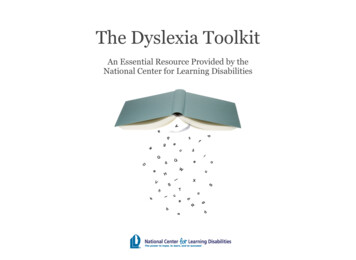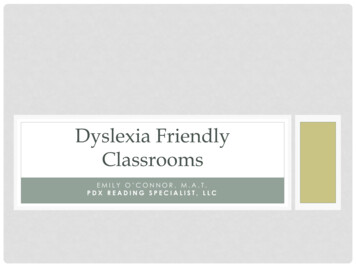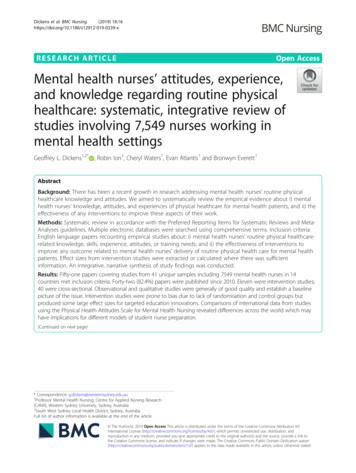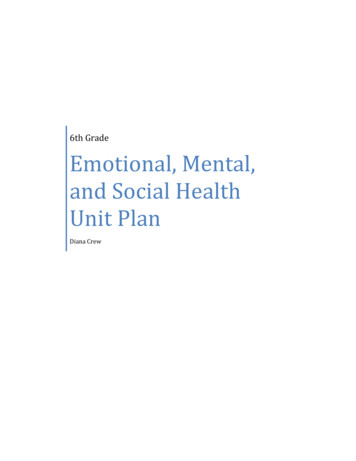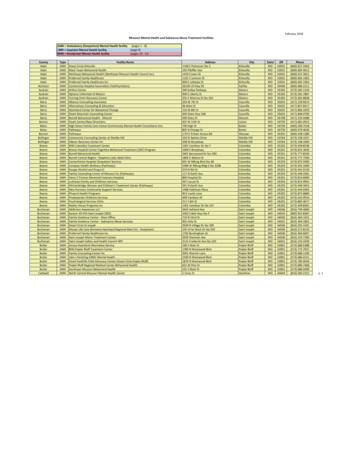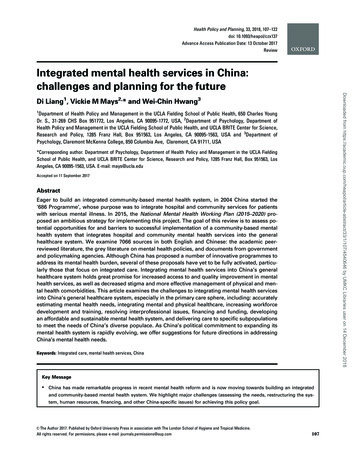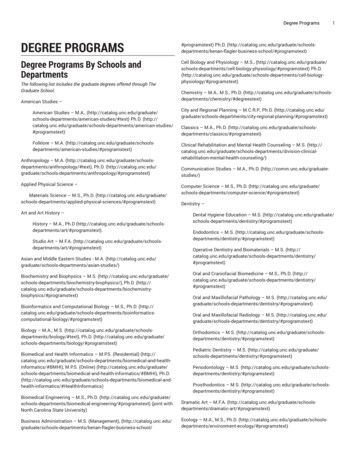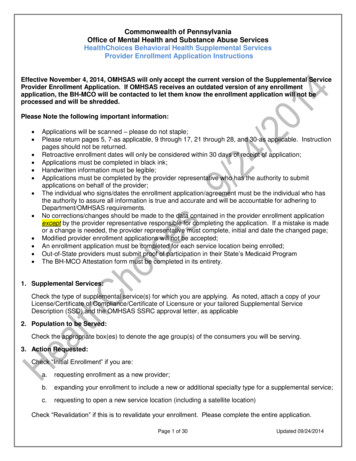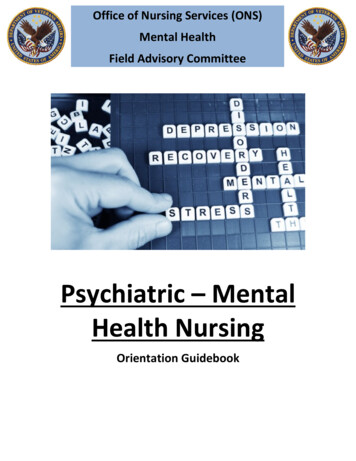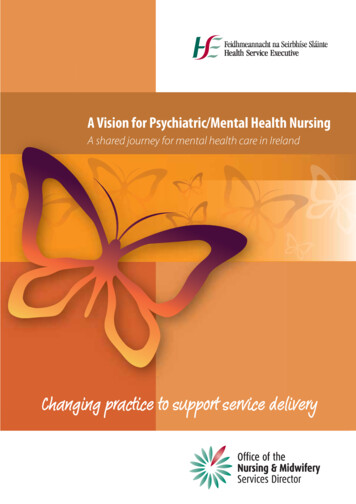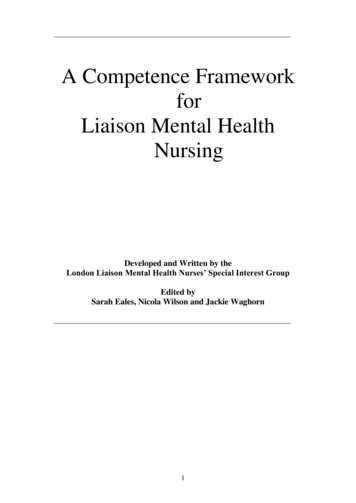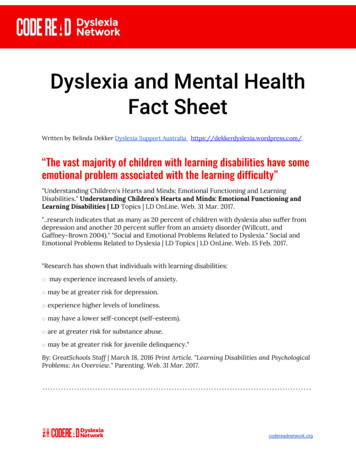
Transcription
Dyslexia and Mental HealthFact SheetWritten by Belinda Dekker Dyslexia Support Australia https://dekkerdyslexia.wordpress.com/“The vast majority of children with learning disabilities have someemotional problem associated with the learning difficulty”"Understanding Children's Hearts and Minds: Emotional Functioning and LearningDisabilities." Understanding Children's Hearts and Minds: Emotional Functioning andLearning Disabilities LD Topics LD OnLine. Web. 31 Mar. 2017.".research indicates that as many as 20 percent of children with dyslexia also suffer fromdepression and another 20 percent suffer from an anxiety disorder (Willcutt, andGaffney-Brown 2004)." "Social and Emotional Problems Related to Dyslexia." Social andEmotional Problems Related to Dyslexia LD Topics LD OnLine. Web. 15 Feb. 2017."Research has shown that individuals with learning disabilities:o may experience increased levels of anxiety.o may be at greater risk for depression.o experience higher levels of loneliness.o may have a lower self-concept (self-esteem).o are at greater risk for substance abuse.o may be at greater risk for juvenile delinquency."By: GreatSchools Staff March 18, 2016 Print Article. "Learning Disabilities and PsychologicalProblems: An Overview." Parenting . Web. 31 Mar. 2017. codereadnetwork.org
Learned HelplessnessLearned helplessness is a conditioned response to continual failure that creates cognitive,motivational, and emotional deficits in children.They have learnt through failure that there is no point trying. Students developself-defeating strategies that impact on their ability to learn.AnxietyAnxiety is a normal human response to situations of stress. It is a flight or fight response toa fearful situation. If anxiety becomes out of control and starts to impact on daily life theanxiety becomes a mental health disorder.Children with dyslexia are under a great deal of stress. Students with dyslexia must facedaily tasks that they find extremely difficult.When anxiety is experienced it is common to avoid the situation as a protective response.Avoidance behaviour can be interpreted as laziness or misbehaviour and may result inschool refusal and learned helplessness.Anxiety SymptomsAvoidance of school work, school absenteeism.Panic attacks, increased heart rate, increased breathing rate, tense muscles, nervousness,fatigue, headaches, vomiting, upset stomach.Self EsteemA child will dyslexia is constantly confronted with situations of failure and frustration in theschool setting. When mastery of skills falls short of peers than it can have a significantimpact on self esteem.Depression"Depression is also a frequent complication of dyslexia. Children with this kind of learningdisability are at higher risk for intense feelings of sorrow and pain. Perhaps because of theirlow self–esteem, dyslexics are afraid to turn their anger toward their environment and codereadnetwork.org
instead turn it toward themselves. The depressed dyslexic not only experiences great painin his present experiences, but also foresees a life of continuing failure." Ryan andInternational Dyslexia Association"Research conducted by Dr. Kenneth Kavale of the University of Iowa and Dr. Steven R.Forness of the University of California at Los Angeles indicates that as many as 70% ofchildren with learning difficulties suffer from poor self-esteem." By: GreatSchools Staff March 18, 2016 Print Article. "Learning Disabilities and Psychological Problems: AnOverview." Parenting. Web. 31 Mar. 2017.Strategies for promoting learned optimismIntrinsic motivation refers to behaviour that is motivated by internal rewards. Extrinsicmotivation involves engaging in a behaviour in order to earn a reward or avoidpunishments."The cure for learned helplessness is not the rediscovery of positive thinking. It does notconsist in just learning to say positive things to yourself. What is crucial is what you think,changing the destructive things you say to yourself when you fail or have setbacks andmaking these statements a part of your explanatory style.” Gordon, Robert, and MyrnaGordon. The Turned-off Child: Learned Helplessness and School Failure. Salt Lake City, UT:American Book Pub., 2006. Print.Strategies to minimise stress‣ Coping cards- coping cards are a set of small cards or a little booklet with strategies forthe student to control their anxiety. These should be designed in conjunction with thestudent. For younger students a pictorial reference can be added. When a student isexperiencing stress it is difficult for them to remember or initiate their strategies.‣ Belly or deep breathing- control of breath is a well recognised strategy for controllinganxiety and stress. Encourage deep slow breaths.‣ Muscle relaxation‣ Mindfulness- mindfulness is a form of self awareness meditation adapted from Buddhisminto Western medicine. codereadnetwork.org
Cognitive Behaviour TherapyCognitive Behaviour Therapy (CBT) is a psychologist guided therapy used in the treatmentof depression, anxiety learned helplessness and self esteem. The goal of CBT is typically tochange automatic unhelpful or negative thought patterns and replace them with a morepositive thought process. CBT has been practised widely for more than 30 years. It hasbeen researched extensively, and has demonstrated effectiveness with a variety ofemotional psychological and psychiatric difficulties.Extrinsic motivation ,when used appropriately, can encourage reluctant students andenable positive associations to be made with school work.Praise :EffortStrategyFocusImprovementPromote :Autonomy- having control over a task.Competence- feeling that you can succeed.Relatedness- care and respect and connection.Relevance- school work needs to be engaging.ALWAYS SEEK PROFESSIONAL HELP AND ADVICE IF CONCERNED ABOUTMENTAL HEALTH‣ Start with your GP and school counsellor.‣ Children can be very good at hiding their mental health issues and may be suffering to agreater extent than you realise.‣ Mental health problems may be exhibited in an array of coping mechanisms such asanger, obsessive behaviours, defiant behaviour, and avoidance behaviour." headspace is the National Youth Mental Health Foundation providing early interventionmental health services to 12-25 year olds, along with assistance in promoting youngpeoples’ wellbeing. " Headspace"The BRAVE Program is an interactive, online program for the prevention and treatment ofchildhood and adolescent anxiety. The programs are free, and provide ways for children codereadnetwork.org
and teenagers to better cope with their worries. There are also programs for parents." TheBRAVE programMake an appointment to see your GP for one of 2 optionsMental Health Plan gives you access to a psychologist of your choice and the GP can referyou to a psychologist to meet your needs. Medicare rebate will cover less than half the costdepending on the fees.Access to Allied Psychological Services ( ATAPS ) enables GPs to refer to specificpsychologist for limited free sessions.DisclaimerThe information in this fact sheet is presented by Belinda Dekker for the purpose of disseminating information to the public. Belinda Dekker does notmake any representation or warranty about the accuracy, reliability, currency or completeness of any material contained in this fact sheet or on anylinked site.While I make every effort to ensure that the material on this guide is accurate and up-to-date, you should exercise your own independent skill andjudgement before you rely on it. This guide is not a substitute for independent professional advice and users should obtain any appropriateprofessional advice relevant to their particular circumstances. Links to other websites are inserted for convenience and do not constitute endorsementof material at those sites, or any associated organisation, product or service.In some cases the material in this guide may incorporate or summarise views, standards or recommendations of third parties or comprise materialcontributed by third parties (‘third party material’). Such third party material is assembled in good faith, but does not necessarily reflect theconsidered views of Belinda Dekker, or indicate a commitment to a particular course of action. Belinda Dekker makes no representation or warrantyabout the accuracy, reliability, currency or completeness of any third party information.Belinda Dekker is not liable for any loss resulting from any action taken or reliance made by you on any information or material in this guide(including, without limitation, third party information)Code Read Dyslexia Network AustraliaGet in contact with us:info@codereadnetwork.orgPO Box 493CURTIN ACT 2605Australia codereadnetwork.org
Fact Sheet Written by Belinda . Children with this kind of learning disability are at higher risk for intense feelings of sorrow and pain. Perhaps because of their low self–esteem, dyslexics are afraid to turn their anger toward their environment and c o d e r e a d n e t w o r k . o r g instead turn it toward themselves. The depressed dyslexic not only experiences great pain in his .
